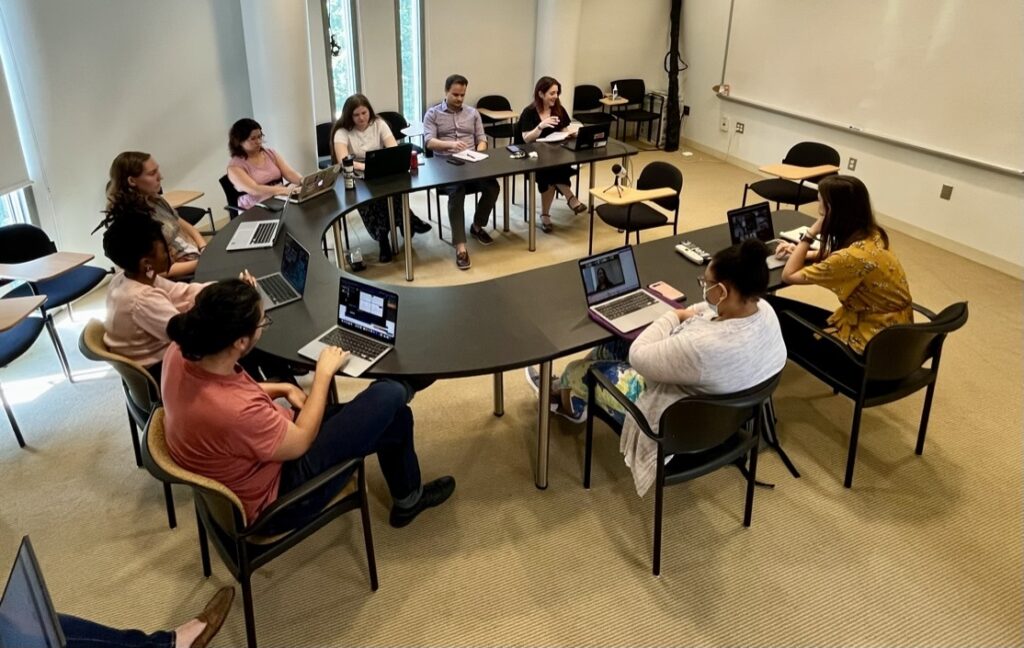Graduate students lead innovation at RRCHNM.
We train the next generation of digital historians through our graduate programs. GMU’s Ph.D. program is second to none in digital history, and it shows in the success of our graduates in public and academic history, libraries, archives, museums, research centers, education, and more cultural heritage institutions throughout the county. Building on what they have learned working alongside RRCHNM’s faculty and staff, graduate students create groundbreaking, rigorous dissertation research. Unlike practically every other university, RRCHNM’s graduate students can create innovative digital histories for their dissertations, thus showcasing the relevance of their historical scholarship.
Traditional methods meet new media.
Graduate programs in history at George Mason University prepare students for careers in academia, public history, historical research, educational administration, and more. Students gain expertise in conventional historical methods taught by department faculty and digital history through courses taught by RRCHNM faculty. All graduate students at GMU gain a foundation in digital history through “Clio Wired: An Introduction to History and New Media.” Digitally inclined students may opt to take further courses in digital history including “Data Analysis for History,” “Spatial History,” “Digital Public History,” “Teaching and Learning History in the Digital Age,” among others.

GRAs, Graduate Affiliates, and Digital History Internships
Graduate students can connect with RRCHNM during their studies at George Mason University as Graduate Research Assistants (GRAs), Graduate Affiliates, or through Digital History Internships.
Graduate Research Assistantships are awarded by the department and RRCHNM to digitally inclined Ph.D. students. GRAs at RRCHNM actively contribute to important projects under the guidance of RRCHNM faculty and staff. They work at RRCHNM for their assistantship and participate in center-wide workshops, working groups, and day-to-day activities.
All Ph.D. and M.A. students at GMU are also welcome to apply for affiliate status each semester. Affiliates are welcome to join in all of the center’s professional development activities. Graduate affiliates contribute to and expand the intellectual knowledge base of RRCHNM by joining workshops, invited talks, working groups, and other center events. Graduate affiliates are eligible for financial support from RRCHNM for their independent research in digital history.
Graduate students at and external to GMU seeking formalized classroom training in digital methods may enroll in the Digital Public Humanities Graduate Certificate program. The Graduate Certificate in Digital Public Humanities is a 15-credit program taught entirely online, 6 credits of which are tied to an internship in digital history. RRCHNM often accepts interns through the certificate program, to learn and work more closely with our faculty. Additionally, M.A. students at GMU not enrolled in the certificate program, but seeking an internship in digital history, have often found opportunities at RRCHNM.
Digital Dissertations
Traditionally, a dissertation in a format like a print book has served as the signature capstone element of the doctoral research degree in history. RRCHNM’s focus on digital history within The Department of History and Art History at George Mason University allows students to develop the methodological skills to produce digital dissertations if they choose. Successful digital dissertations have varied in form, incorporating methods ranging from network analysis, to the creation of maps and data visualizations, to hypertext histories. Alumni who chose to develop a digital dissertation over a traditional monograph have gone on to secure prestigious post doctoral fellowships, gone on to become professors, and have been appointed as leadership for other DH centers. Explore past digital dissertations by successful alumni by clicking through the examples on the right.
- Potomac Networks: Waterways, Commerce, and Enslavement in the George Mason Family, 1700–1828 – Dr. Greta Swain
- Modeling the Religious Culture of Seventh-day Adventism 1843-1920 – Dr. Jeri E. Wieringa
- Mapping Deaf Missions – Dr. Jannelle Legg
- They Need You! Disability, Visual Culture, and the Poster Child, 1945-1980 – Dr. Celeste Sharpe
